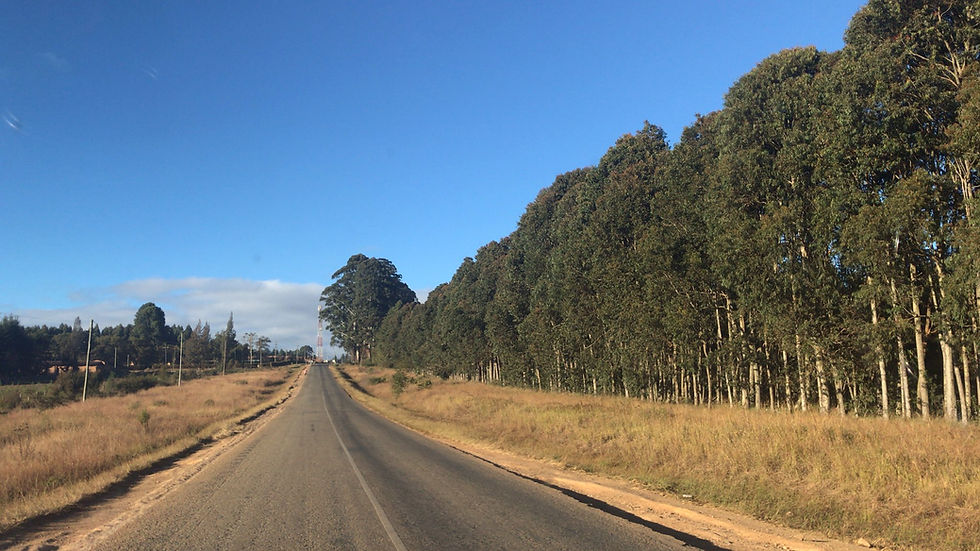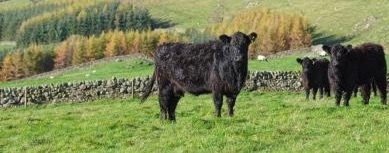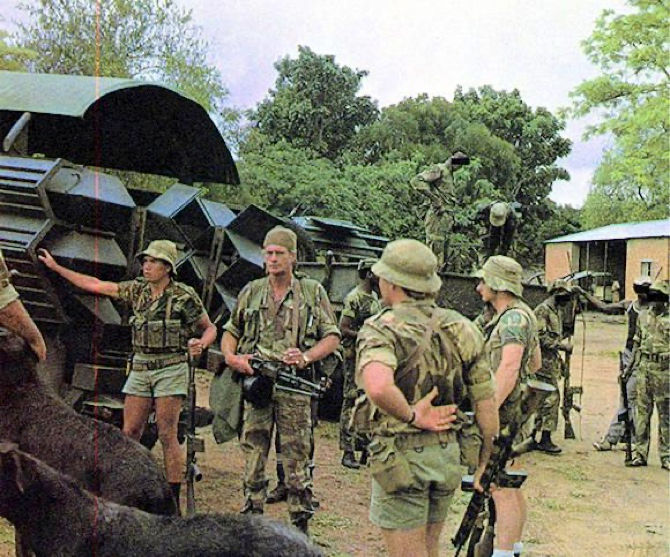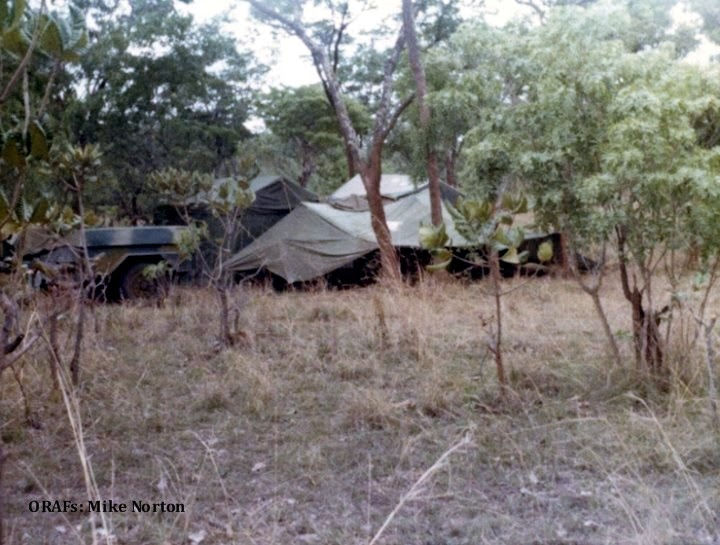
After viewing the meeting on possible compensation to Zimbabwean farmers for their confiscated land and belongings on the 29th of August and following last week's blog on that meeting I thought not for the first time that the common perception is that farmers are uneducated fools to be taken advantage of while pursuing and enjoying their chosen lifestyle. Easy victims both to politicians and Greenies, the latter uncontrolled bullies to those they consider of lesser intellect than themselves unable to recognise their own ignorance due to their self-righteous arrogance.
“I have on many occasions looked up at the clear blue sky and repeatedly called myself a fool. Why did I plant these extra hectares? One good shower of rain and I would no longer consider myself stupid but wise.” - Peter McSporran
Farmers it would seem as a rule are to be criticised and taken unfair advantage of whenever possible, be it for their farming methods or the sale of their produce. Some people suffer envy for our lifestyle even if it does mean extended hours of hard work often with little or no reward. Something few would be capable of doing. Hardship to them is an early morning run around the park if the weather is fine. Sure, farmers are the daily masters of their own time management, both physical and mental, in their efforts to run the farm as a business. Other than that, their lives rely on many masters including government regulation, which is rarely logical, the banks for the supply of finance, many input creditors and most importantly the demands of their customers.
Their customers are the consumers who are happy to use supermarkets as their procurement agents to ensure the cheapest price for the best product. They now find the local grocery store or market no longer convenient. They need a ‘one-stop-shop’ offering the most competitive prices that cannot be beaten in town. Meanwhile, the farmer runs the risk of the markets, who knows what the price of his grain will be next year when he harvests his crop or in two and a half years when he sells that bullock from the cow the bull has just served? On top of all this, he has weather risks, nobody is more aware or in more fear of climate change than the farmer.
On top of that, farmers are custodians of the soil, their livestock and the wild flora and fauna on their land. It seems now in the dawning of green enlightenment many, especially vested interest pressure groups, feel farmers need guidance in carrying out this centuries-old working masterpiece of husbandry. Further, whatever they do must come under intense scrutiny coupled with much unwanted and unwarranted advice. Many with perceived ideas on their own specific subject of self-proclaimed expertise be it soil carbon, livestock welfare or even frogs in your pond. In fact, they are so dedicated that they will pour milk onto the floor taken from the fridges in Harrods in protest or demand protection for that badger that has just caused the slaughter of a pedigree herd of cattle due to it being a TB carrier or the fox that has killed your lambs.
The latest in farmer bashing is that they are one of the leading causes of climate change. I think we have all learned recently, through them, how much our cows fart and by applying fertiliser how we are also busy polluting our streams, rivers and air.
I thought to myself, is what we are being told true? Are cows and sheep really that bad for the atmosphere? Are we in Britain wasting money on excess fertiliser at the present exorbitant prices?
I, therefore, decided to look into the facts, of course through the internet, and this is what I found in a table on WorldData compiled by Dr Max Roser and Dr Hannah Ritchie from recent study findings. Of course, the findings of these studies can and should be challenged. The link to the study is:
The study was in identifying the main sources of human activity creating climate-changing gases.
Energy (electricity, heat and transport): 73.2%.
Direct Industrial Processes: 5.2%
Waste: 3.2%
Agriculture, Forestry and Land Use: 18.4%
Agriculture is further broken down into the following:
Grassland (0.1%): When grassland becomes degraded, these soils can lose carbon, converting to carbon dioxide in the process. Conversely, when grassland is restored (for example, from cropland), carbon can be sequestered.
Rice cultivation (1.3%): Flooded paddy fields produce methane through a process called ‘anaerobic digestion'.
Cropland (1.4%): Depending on the management practices used on croplands, carbon can be lost or sequestered into soils and biomass.
Deforestation (2.2%): Net forestry change is therefore the difference between forestry loss and gain.
Crop burning (3.5%): The burning of agricultural residues – leftover vegetation from crops such as rice, wheat, sugar cane, and other crops.
Agricultural soils (4.1%): Nitrous oxide – a strong greenhouse gas – is produced when synthetic nitrogen fertilisers are applied to soils.
Livestock & manure (5.8%): Animals, mainly ruminants, such as cattle and sheep produce greenhouse gases through a process called ‘enteric fermentation’ – when microbes in their digestive systems break down food, they produce methane as a by-product.
I have shown these results as they were quite enlightening to me.
It is clear we can mitigate against some of these with improved farming practices without changing our levels of production. We can do this without turning good arable land into daisy patches. Yes, do set unproductive land and waterways aside for the birds and the bees but be circumspect about it. Some of the easy fixes include the more precise use of fertilisers, easily done with soil fertility mapping and variable application of fertilisers using a GPS. Cease crop residue burning. Sugar cane needs more attention at harvest. Interestingly, intensely housed livestock production is a high source of nitrous oxide and methane, more so than the poor ‘Heilan Coo’ or Blackface sheep grazing a hillside. There is little or no livestock in the hills around us here in Portugal, the vegetation better described as a scrub jungle extremely prone to horrific annual wildfires. Interesting viewing on the television, devastating and at times deadly to the local rural dwellers. How does this fire pollution compare to a few cows grazing and browsing the native vegetation?

The major greenhouse gas that is produced by ruminants is methane. Of course, some scientists have done the estimating of impact and while methane’s impact is much greater short term than carbon dioxide, it dissipates within ten years while carbon dioxide is around for thousands of years and accumulates. I wonder why we do not say to our children, getting into the car or school bus, “Do you know the carbon from this vehicle will be here for a thousand years?”
Through reading, I have found there is a lot of scientific argument around how to quantify methane in comparison to carbon dioxide. The dispute on it is just that still. Nitrous oxide also hangs around for one hundred years but it does disappear once again unlike carbon dioxide. Funny, the vegans do not hit out about the way their food is produced, rather take on the poor farting cows. In comparison to everything else, the cows are certainly not the most guilty and with negligible short-term emissions compared to the energy industry. Perhaps something on organic fruits and vegetables next week, after all, which due to the huge premium, only 2.8% of us can afford to eat it. The fact remains that the latest warcry is, “let's kill the cows.” Rather do this than turn the central heating down a degree. That would reduce emissions by 3.5 million tonnes alone. Is there a political agenda here?

While I was thinking about this farmer-bashing, I happened to read a farming twitter this morning. I follow a number of farmers on Twitter on their daily routines, you know us old farmers like to see what is happening on the land.
“60 acres condemned to the flail(slasher) because the cauliflower hearts didn’t meet their(supermarket) criteria (10-12.5cm). £2k+ per acre to grow! Nutritionally the same, just smaller hearts! Madness.” - Steve Evans
This is what is known as cosmetic specification. Just like the pineapples from Ghana, the carrots from Norfolk or the mangoes from Zimbabwe. If they are the wrong shape, colour, size or weight, they are rejected. Supermarkets dictate strict cosmetic specifications to farmers, meaning they will buy fresh produce that fits exacting size, shape and colour specifications regardless of the nutrition, taste and value of the food.
In my further surfing, I do this in my retirement’s idle hours which cannot be called research, I then learned this.
“Food waste represents an ecological catastrophe of staggering proportion: food production is the single greatest environmental impact humans have on the planet, and wasted food, if it were a country, would rank as the third largest emitter of greenhouse gases after China and the US” (FAO, 2013)
Of course, we know from earlier, energy has the greatest impact on climate change, not food production.
Now that is mind-boggling. Is it those dumb farmers and their practices that are causing this waste? The answer is no, it is much closer to the consumer.
"Research and investigations in supply chains, both in the UK and around the world, have consistently shown that supermarkets’ business practices drive waste. Trading practices, including order cancellations, last minute changes to forecasts, retrospective changes to supply agreements and the use of cosmetic specifications to reject produce, all cause food to be wasted. Some of these trading practices may be considered ‘unfair’, that is to say, they deviate from commercial good conduct and good faith." (European Commission, 2016).
Produce rejected for cosmetic reasons, such as being the wrong shape, size or colour, was the biggest reason for food waste identified in this research. Due to natural uncontrollable factors like weather and pests, farmers over plant to produce the contracted quantities. To avoid risking the loss of contracts, farmers must meet buyers’ orders in full – to guarantee this, they must overproduce. The inflexibility of supermarket contracts has normalised overproduction and the resulting waste.
I wonder how much the best-by-dates contribute to these losses. I have also had a look at them and if nothing more exciting comes up will include some thoughts on that next week. After all, Al Capone was the first to introduce them.
PATU
On joining Police Anti Terrorist Unit (PATU), I immediately found a huge change from the army. Firstly, call-ups were much shorter although more frequent, rarely more than two weeks, often in commercial farming areas or those Tribal Trust Lands (TTLs) adjacent to them. Each rural police station would have local PATU sticks who would be well acquainted with both the people and the geography of the area, many with their own informant networks on their farms. For us in Darwendale, as a fairly peaceful area, we were more often or not sent to what was known as hot areas. A few times in the Sinoia area, sometimes the Great Dyke to the north but by far most frequently back to the area where I had worked as a farm manager in Enterprise. Enterprise, Acturus and Goromonzi had all become very hot areas, especially in the surrounding TTLs.

While the stick leaders were in charge they were normally answerable to the local Special Branch (SB) or Ground Coverage (Intelligence) representative. In Enterprise, that was Mike Norton. He also organised the efforts and succeeded in stopping the infiltration of CTs into the capital, Salisbury just some 30 kilometres away. Especially during the Zimbabwe/Rhodesia elections of 1979. A book was written about this operation which we became part of in 1979. Operation Enterprise: The Battle for Salisbury, Rhodesia By Nick Skipworth-Michell.
The Enterprise Club’s pub was still open but frequented by security forces with a permanent presence there, including army and PATU.
For us, when deployed we would have the club as our base. There were no barracks; rather we would either live under our bivvies or if lucky find shelter under the tennis courts pavilion which in reality was an open lean too shed. Of course, this was normally on the day of deployment, the rest of the time we spent in the field.
People have often asked what happened to the enemy's casualties. Externally many thousands were left where they fell as those raids took place under the noses of Frelimo, the Mozambican army, who often fought and assisted the CTs. Escape was the priority not burying the dead. Internally they were all brought back to the nearest police station for identification, if possible. This included fingerprinting and comparison of their weapons to previous contacts and attacks on security forces and civilians, including farmers. Captured CTs were often offered the chance to change sides, which many did as the alternative could well be a date with the hangman's noose, especially if their weapon had been used or they had been identified as taking part in a homestead attack or an atrocity. At the start of the war, they were often picked up by vehicle or loaded into a helicopter. As numbers increased, the grisly sight of bodies in cargo nets could be seen below helicopters on the way to identification which was followed by cremation. The golf course section at Enterprise Club had one such site for cremation, more closely identifying with a Hindu funeral pyre than a western crematorium. Despite this grisly pyre smouldering day and night, golf was still played by local farmers.

My section leader for the first few call-ups was Trevor le Clue, a steady guy, liked by all. Early on when I joined his stick he stunned me by being able to reject an order which required us to go into harm's way with no backup support. That is; troops to offer support if we got into difficulty. A prerequisite for successful military operations. This particular order was from the member in charge, Goromonzi, who wanted us in daylight to take on a much superior force of CTs which had just recently ambushed and killed a number of his police officers. In the army, you never refused an order, but in the army your commanders always ensured you had backup normally in the form of Fireforce or air cover if a large contingent of the enemy was engaged. Trevor was no coward, just sensible. As I say, as an ex-army sergeant, this was an eye opener. It also revealed to me the lack of knowledge some of the uniform police had in conducting guerrilla warfare. In fact, Mike Norton the senior SB and local commander was a reservist, on permanent callup, a proven excellent commander, it is worth reading the book about him.

As stated earlier, Smith had come to an agreement with some of the factions, excluding Mugabe’s ZANU or Nkomo's ZIPRA to share power under the guise of a unity government in a country to be called Zimbabwe Rhodesia. Unlike the army training, PATU training was more spasmodic, we all knew each other so were familiar with how we best operated together all having extensive previous military training. We would often choose the sticks we wished to join and after a few stints with Trevor and then Russel Smith I became a stick leader. It must be said the war stories on the return of each stick from Enterprise got hairier and hairier as the year passed. I remember one such training day when Christo Borman came back after his stick had a particularly hard time, finding the CTs the aggressors as much as themselves. Despite the more flexible time in the bush to enable me to farm I did have twinges in regard to not having the same supportive operational structure as the army. Oh well, you make your bed and lie in it.
On to Iringa
On our travels, through the Southern Highlands, we spent a night in Njombe after visiting the van Aards. While there we visited the Tanganyika Wattle Company Ltd (TANWAT) which used to belong to Lonrho, part of Tiny Rowlands empire. It was at that time and probably still is owned by a Kenyan-Asian company carrying out forestry and wattle growing. Interestingly, they had developed a 2.5Mw biomass-fueled generating plant using the waste timber from the wattle. Only the bark of wattle contains tannin which is used for tanning hides along with other processes. With the waste biomass available, they had the ability to increase their generation to 15Mw. This was not happening, as similarly, others found because the Tanzania government would not grant them a viable offtake agreement for their excess power. Negotiations had been going on for years, despite the country being short of generated power. We also experienced the same issues when we supported some micro hydro projects at a later date. Africa!!! Its own worst enemy.
A hilarious incident happened that evening at the newly built local glitzy hotel in Njombe. As in many cases these hostelries often open before the building is complete. I am not talking about internal finishings, more actual buildings including the upper floors. If you have to stay in one of these try and get a lower floor bedroom as there is more chance of the plumbing being installed while on the upper floors even with plumbing in place, the water pressure is rarely enough to supply water above the first floor. Andrew’s first mistake was getting a room on an upper floor, no water to shower. I do not think the plumbing was even installed. Now Andrew’s background is Christian and he is a practising Christian so in some of our eyes he would appear to have had a sheltered life from the world's harsh realities. Now, as an old Tanzanian hand, he is far from that.
Later that evening, after the manageress killed the oldest and fittest cockerel in Tanzania for our supper, we enjoyed a couple of beers while indulging in the usual round-the-fire banter. While this was going on, the manageress, who was inclined to advertise her copious wares, flirted with Andrew in a subtle manner although somehow unbeknown to him. When we finally got the bill, we found what we presumed must have been wine included in the drinks listed. It seemed like an expensive drink with an exotic name. Of course, being Dutch, Han immediately pointed out to the manageress we had had no such drink to which she replied that it was not a drink but for her services to the young man if he so required. This was very much to Andrew’s embarrassment. Han and I still have a laugh about it. Needless to say, the offer was not taken up with an immediate refund demanded. So it can be travelling in Africa.
Next day we headed the back way through the mountains to Iringa.
Disclaimer: Copyright Peter McSporran. The content in this blog represents my personal views and does not reflect corporate entities.
Comments